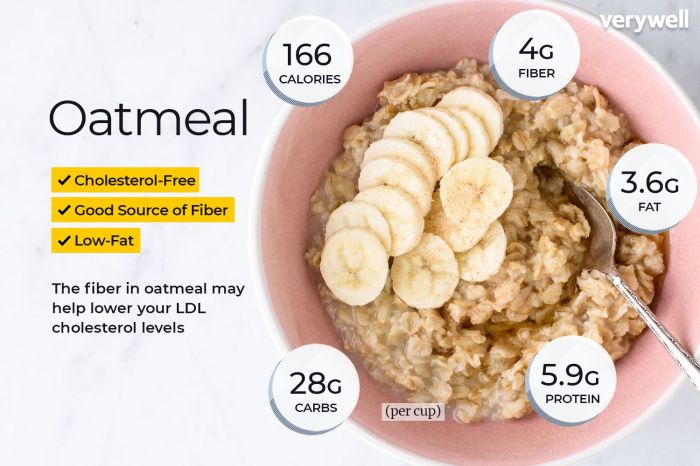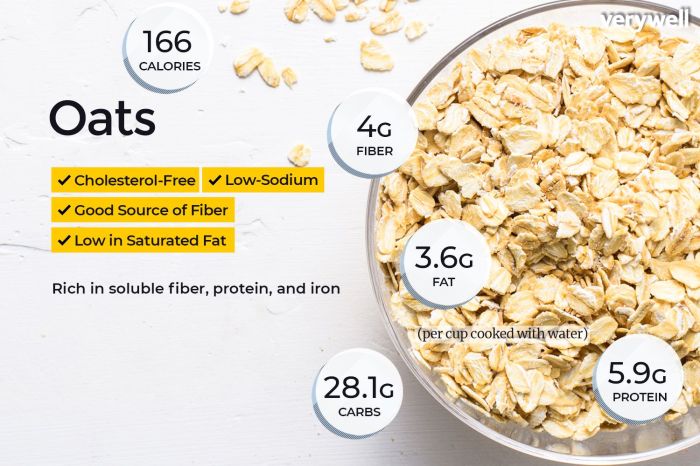Nutritional Composition of 1 Cup Oatmeal: Nutrition Facts 1 Cup Oatmeal

Nutrition facts 1 cup oatmeal – Okay, so you’ve got your bowl of oatmeal, right? Seems simple enough, but let’s dive into the nutritional nitty-gritty. This isn’t your grandma’s mush; we’re talking serious fuel for your body. One cup of cooked oatmeal packs a surprisingly powerful punch.
Understanding the nutrition facts of 1 cup of oatmeal, a breakfast staple rich in fiber and whole grains, provides a valuable benchmark for healthy eating. A comparative analysis often involves considering alternative breakfast choices, such as the carbohydrate content and caloric density found in multigrain bagel nutrition facts , which can be significantly higher. Returning to oatmeal, its nutritional profile highlights its role in sustained energy release, contrasting with the quicker energy spike and subsequent drop often associated with refined carbohydrates.
Therefore, a direct comparison aids informed dietary choices.
Macronutrient Breakdown
A typical 1-cup serving of cooked oatmeal (about 240 grams) provides a healthy balance of macronutrients. We’re talking carbohydrates, proteins, and fats – the building blocks of your energy and bodily functions. The exact amounts can vary slightly depending on the type of oats (rolled, steel-cut, instant) and any added ingredients, but let’s look at a general picture.
You’re likely looking at roughly 50 grams of carbohydrates, 5-7 grams of protein, and 2-3 grams of fat. A significant portion of those carbs comes from fiber, crucial for digestive health and keeping you feeling full. We’re talking about around 4 grams of fiber per cup, a considerable chunk of your daily recommended intake.
Micronutrient Profile
Beyond the macronutrients, oatmeal is a surprisingly good source of various vitamins and minerals. Think of it as a tiny, delicious multivitamin. A single cup boasts a decent amount of manganese, magnesium, and phosphorus – all essential for bone health, energy production, and other vital processes. You’ll also find respectable levels of zinc, selenium, and iron, which play important roles in immune function and oxygen transport.
Vitamin B1 (thiamine) is present in good quantities, contributing to nerve function and energy metabolism. The exact amounts vary, but we’re talking significant contributions to your daily needs.
Glycemic Index and Load, Nutrition facts 1 cup oatmeal
Now, let’s talk GI and GL – Glycemic Index and Glycemic Load. These numbers tell you how quickly a food raises your blood sugar levels. Oatmeal, particularly rolled oats, boasts a relatively low glycemic index compared to many other breakfast cereals. This means it provides a more gradual and sustained release of energy, preventing those dreaded blood sugar spikes and crashes.
This is in stark contrast to sugary cereals which can send your blood sugar soaring. The glycemic load takes into account both the GI and the serving size. For oatmeal, the GL is also relatively low, making it a smart choice for those watching their blood sugar levels. Think of it this way: a slow and steady burn versus a quick burst of fire that fizzles out.
Nutritional Information Table
| Nutrient | Amount per 1 Cup | % Daily Value | Notes |
|---|---|---|---|
| Calories | 150-170 | ~7-8% | Varies slightly based on oat type and preparation |
| Carbohydrates | ~30-35g | ~10-12% | Includes fiber |
| Fiber | ~4g | ~16% | Promotes digestive health |
| Protein | ~5-7g | ~10-14% | Contributes to muscle building and repair |
| Fat | ~2-3g | ~3-5% | Mostly unsaturated fats |
| Iron | ~2mg | ~11% | Essential for oxygen transport |
| Magnesium | ~80mg | ~19% | Important for bone health and energy production |
| Manganese | ~1mg | ~50% | Plays a role in many metabolic processes |
Health Benefits of Oatmeal Consumption

Okay, so you’ve got your nutritional breakdown of a cup of oatmeal. Now let’s talk about why you should actuallyeat* the darn stuff. It’s not just bland mush; it’s a nutritional powerhouse, a breakfast champion, a fiber-filled friend. Seriously, this stuff is awesome.
Oatmeal’s Impact on Heart Health
Oatmeal’s got this thing going for it called beta-glucan, a type of soluble fiber. This magical fiber helps lower LDL cholesterol (“the bad cholesterol”) and can even slightly improve your HDL cholesterol (“the good cholesterol”). Think of it as a tiny, delicious cholesterol-busting ninja. Lower cholesterol means a reduced risk of heart disease, stroke, and all that other fun stuff doctors warn you about.
Plus, some studies show it can help manage blood pressure, keeping your heart happy and humming along. Imagine your heart doing a happy little jig every time you eat a bowl of oatmeal – that’s the kind of positive effect we’re talking about.
Oatmeal and Digestive Health
Let’s talk fiber again, because it’s a big deal. Oatmeal is packed with it, and this fiber acts like a broom for your digestive system. It sweeps things along, preventing constipation and promoting regularity. It also feeds the good bacteria in your gut, which is crucial for a healthy microbiome – basically, a happy gut equals a happy you.
No more tummy troubles! Think of your digestive system as a well-oiled machine, and oatmeal is the high-quality lubricant keeping everything running smoothly.
Oatmeal’s Role in Blood Sugar Control
Here’s another benefit: oatmeal’s fiber slows down the absorption of sugar into your bloodstream. This means your blood sugar levels don’t spike as dramatically after eating, which is great news for people with diabetes or those at risk of developing it. This slow and steady release of energy also helps keep you feeling full and satisfied for longer, preventing those mid-morning energy crashes and cravings.
Imagine a slow, steady burn instead of a sugar rush and crash – it’s like a marathon, not a sprint.
Oatmeal’s Contribution to Overall Well-being
Okay, let’s sum this up with a list of all the awesome things oatmeal does for your body. Because, honestly, it’s impressive.
- Promotes heart health by lowering cholesterol and blood pressure.
- Improves digestive health and regularity through its high fiber content.
- Helps control blood sugar levels and improves insulin sensitivity.
- Provides sustained energy, preventing mid-morning crashes.
- Is a good source of essential vitamins and minerals.
- Can contribute to weight management due to its high fiber and filling nature.
- Is relatively inexpensive and easy to prepare.
So yeah, eat your oatmeal. Your body will thank you. It’s not just breakfast; it’s a lifestyle choice. A delicious, fiber-filled lifestyle choice.
User Queries
Can I eat oatmeal every day?
Yes, eating oatmeal daily can be part of a healthy diet, providing sustained energy and essential nutrients. However, variety is key; don’t rely solely on oatmeal for all your nutritional needs.
Is oatmeal good for weight loss?
Oatmeal can support weight loss due to its high fiber content, which promotes satiety and helps regulate blood sugar levels. However, portion control and mindful additions are crucial.
What are the best toppings for oatmeal?
Healthy toppings include berries, nuts, seeds, and a small amount of cinnamon. Avoid excessive sugar or high-fat additions.
Is instant oatmeal as healthy as other types?
Instant oatmeal often contains added sugars and less fiber than steel-cut or rolled oats. Opt for plain, less-processed varieties whenever possible.
